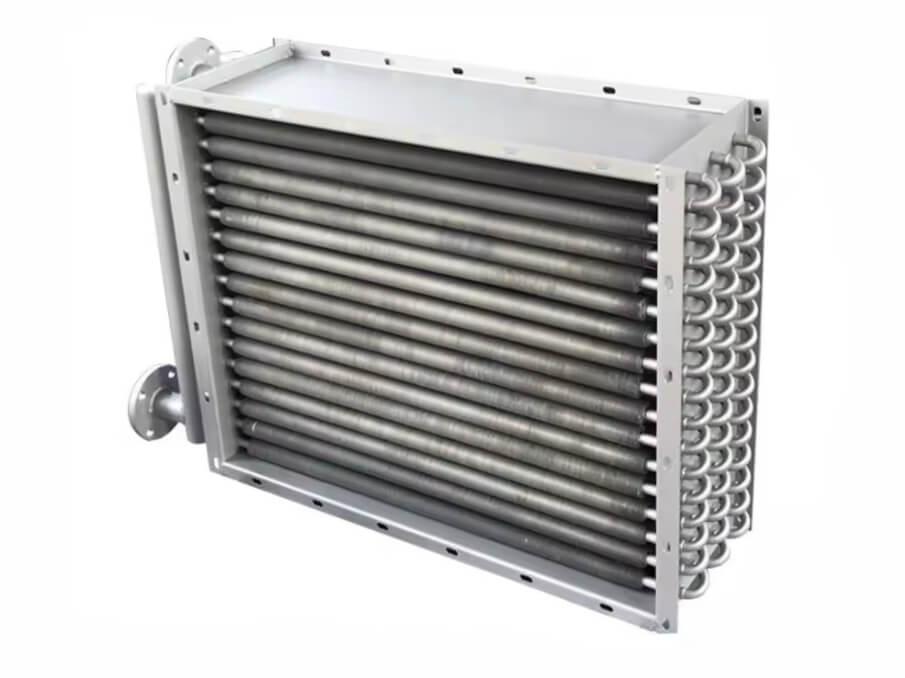In the vast landscape of industrial processes, efficient heat transfer plays a pivotal role in optimizing performance, reducing energy consumption, and ensuring product quality. At the forefront of heat exchange technology, titanium fin tube heat exchangers emerge as a beacon of innovation, offering unparalleled efficiency and reliability across diverse industries. In this comprehensive exploration, we delve into the intricate workings of titanium fin tube heat exchangers, their advantages, applications, and the transformative impact they have on industrial processes.
Understanding Titanium Fin Tube Heat Exchangers:
Heat exchangers are vital components in industrial systems, facilitating the transfer of heat between fluids to achieve desired temperature levels. Titanium fin tube heat exchangers, a subtype of shell-and-tube heat exchangers, enhance heat transfer efficiency through the incorporation of finned tubes. These finned tubes, typically made of titanium due to its exceptional properties, increase the surface area available for heat exchange, thereby maximizing thermal performance.
Advantages of Titanium Fin Tube Heat Exchangers:
- Corrosion Resistance: Titanium’s inherent corrosion resistance makes it ideal for applications involving aggressive fluids and corrosive environments. Titanium fin tube heat exchangers can withstand the corrosive effects of acids, alkalis, and saltwater, ensuring long-term reliability and durability.
- High Thermal Conductivity: Titanium exhibits excellent thermal conductivity, allowing for efficient heat transfer between fluid streams. This property enables titanium fin tube heat exchangers to achieve rapid and uniform heating or cooling, enhancing process efficiency and productivity.
- Lightweight Construction: Despite its exceptional strength, titanium is lightweight compared to traditional materials such as steel or copper. This lightweight construction reduces the overall weight of heat exchanger systems, simplifying installation, transportation, and maintenance.
- Biocompatibility: In industries such as pharmaceuticals and food processing, where product purity is paramount, titanium’s biocompatibility ensures that heat exchangers do not contaminate the process fluids with harmful substances. This feature is critical for maintaining product quality and regulatory compliance.
- Low Maintenance Requirements: Titanium fin tube heat exchangers have minimal maintenance requirements due to their resistance to corrosion, fouling, and scaling. This results in reduced downtime, lower operating costs, and extended equipment lifespan, making them a cost-effective solution for industrial applications.
Applications Across Industries:
- Chemical Processing: Titanium fin tube heat exchangers are widely used in chemical processing plants for heating, cooling, and condensing various chemical compounds. Their corrosion resistance and thermal efficiency make them ideal for handling corrosive fluids and high-temperature processes.
- Petrochemicals: In the petrochemical industry, titanium fin tube heat exchangers play a crucial role in refining processes such as distillation, catalytic cracking, and hydroprocessing. They enable efficient heat transfer in demanding environments, ensuring the reliability and efficiency of refinery operations.
- Power Generation: Titanium fin tube heat exchangers are employed in power plants for steam generation, turbine cooling, and condenser applications. Their high thermal conductivity and corrosion resistance contribute to the efficiency and reliability of power generation systems.
- Food and Beverage: In the food and beverage industry, titanium fin tube heat exchangers are utilized for pasteurization, sterilization, and temperature control in food processing and beverage production. Their hygienic design and biocompatibility ensure the safety and quality of food products.
- Pharmaceuticals: Titanium fin tube heat exchangers are integral to pharmaceutical manufacturing processes such as solvent recovery, crystallization, and sterilization. Their ability to handle sensitive pharmaceutical compounds without contamination makes them essential for maintaining product purity and efficacy.
Innovations Driving Titanium Fin Tube Heat Exchanger Technology:
- Advanced Materials: Ongoing research in materials science aims to develop advanced titanium alloys with enhanced properties such as higher strength, improved corrosion resistance, and greater thermal conductivity, further optimizing the performance of fin tube heat exchangers.
- Finned Tube Design: Innovations in finned tube design, including optimized geometry and surface coatings, aim to maximize heat transfer efficiency and minimize fouling or scaling, improving the overall performance and reliability of heat exchanger systems.
- Smart Heat Exchangers: Integration of smart technologies, such as sensors, actuators, and IoT connectivity, enables real-time monitoring, predictive maintenance, and optimization of heat exchanger operations, enhancing energy efficiency and system reliability.
- Additive Manufacturing: Additive manufacturing techniques, such as 3D printing, offer new possibilities for designing and manufacturing complex heat exchanger components with customized geometries and enhanced performance characteristics, leading to greater flexibility and innovation in heat exchanger design.
Future Perspectives:
As industries continue to evolve and demand for energy-efficient and sustainable solutions grows, the role of titanium fin tube heat exchangers will become increasingly prominent. Advancements in materials science, manufacturing techniques, and smart technologies will drive further innovation in heat exchanger technology, enabling enhanced performance, reliability, and sustainability across diverse industrial sectors.
Titanium fin tube heat exchangers represent a pinnacle of engineering innovation, offering unmatched performance, reliability, and versatility in industrial heat exchange applications. From chemical processing plants to power generation facilities, their exceptional properties make them indispensable for optimizing thermal processes and ensuring the efficiency and reliability of industrial operations. As we look to the future, the continued evolution of titanium fin tube heat exchanger technology holds the promise of transformative advancements in energy efficiency, sustainability, and industrial process optimization, shaping the landscape of industrial manufacturing in the modern era.
